The Independent's journalism is supported by our readers. When you purchase through links on our site, we may earn commission.
Can AirTags help find lost luggage during holiday travel? What I learnt travelling with Apple tracking device
After I landed in New York City, writes Chelsea Ritschel, my AirTag informed me my suitcase was still 5,677 miles away

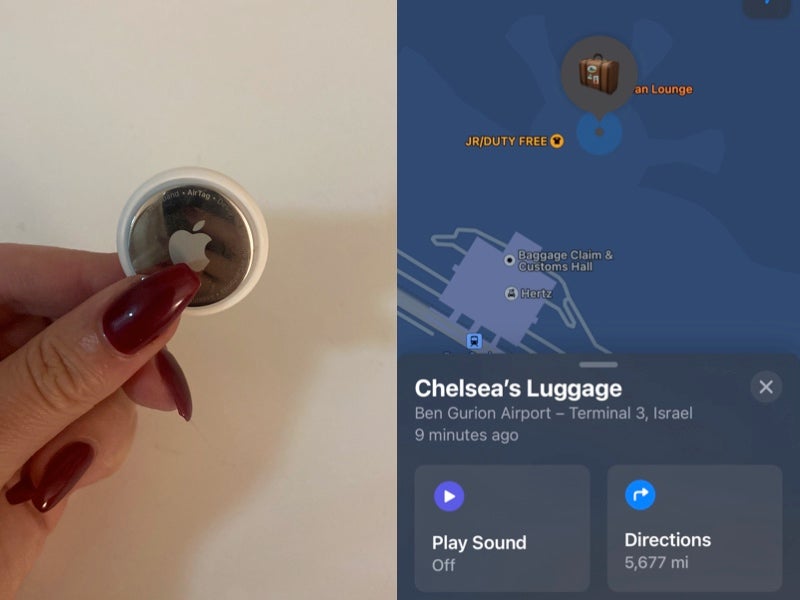
If you’ve travelled anywhere this year, you’ll likely have heard the warnings not to check a bag. The fear – and frankly expectation – was that it would get lost in the ongoing chaos that has become airports in 2022.
The guidance is useful for those who know how to pack lightly, or even appropriately, but not so great for those of us who overpack for even the shortest of trips.
Unfortunately, this inability to travel moderately meant that, in the lead up to a 16-day trip to Israel in August, I was both overpacking and concerned that I would lose all 25 dresses I had crammed into my suitcase for the late summer heat.
What appeared to be an answer to my conundrum came to me in the form of an AirTag, Apple’s controversial tracking devices. Although the devices have become more commonly associated with unwanted tracking, despite the company’s insistence that they were “designed to discourage unwanted tracking”, their intended use is to help users find their belongings.
I’d found myself in the possession of four AirTags months ago, when Verizon gifted me a $100 gift card after I signed up for internet service. After perusing the website for a while, I decided to spend the money on a four-pack of AirTags, mostly as a novelty purchase.
Between over-stuffing my bag and doom-scrolling about lost luggage, I took one of the unused AirTags lying around my apartment, activated it, and threw it in with the mountain of dresses before I left. If my luggage did indeed get misplaced or delayed during the trip, my hope was that I would be able to find it, or at the very least, show an airline employee where Apple’s Find My feature said it was.
What I didn’t expect was how annoying the AirTag would be, a realisation I had when I felt my phone vibrate mere moments after checking my suitcase at New York’s John F Kennedy Airport.
“Chelsea’s luggage: Left at JFK Airport Terminal 4,” the notification read like a clingy ex, with a luggage symbol on a map showing me exactly where my bag was, and how far I’d journeyed from it.
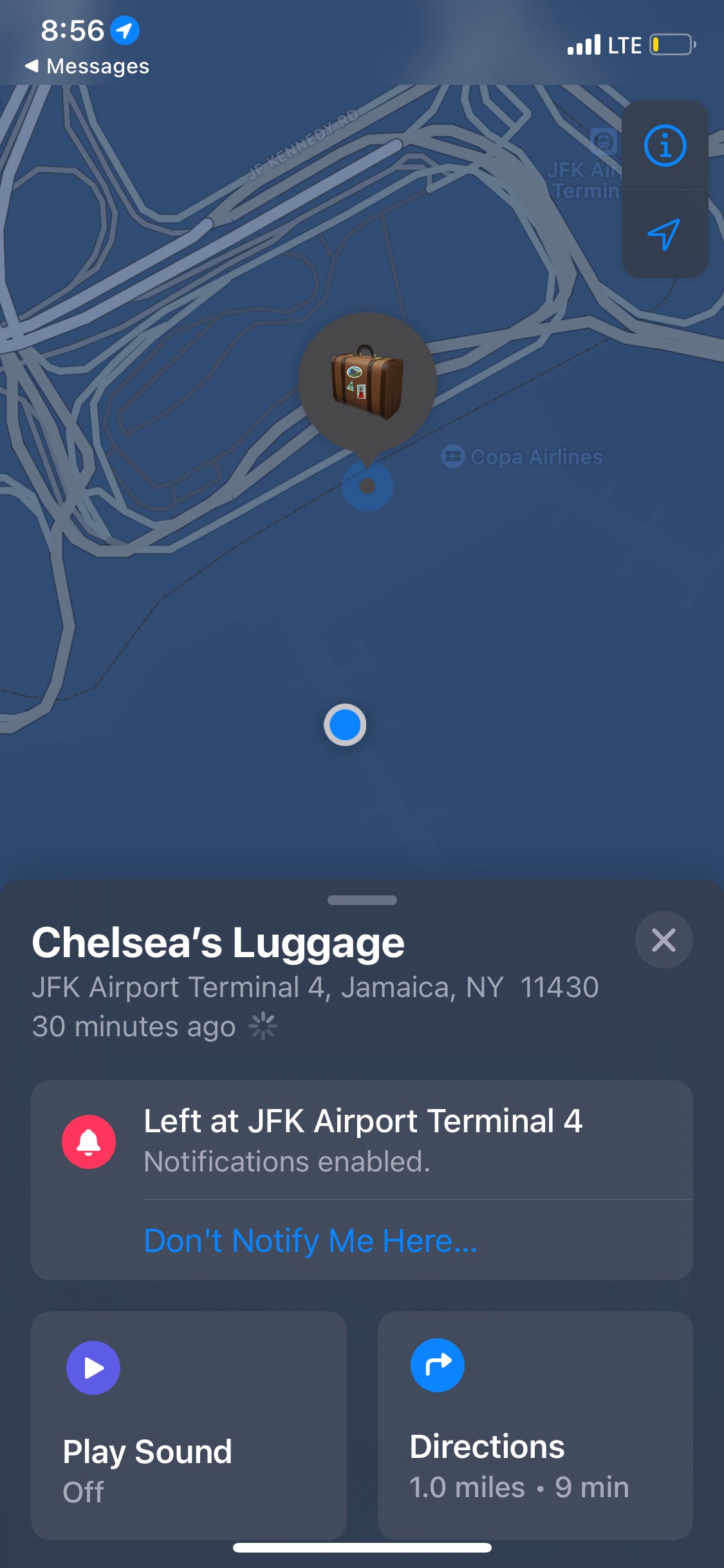
My irritation briefly subsided when I arrived at Ben Gurion Airport in Israel, where I immediately checked my phone to see whether my luggage had arrived with me. To my relief, it had.
The knowledge that my bag had completed the 12-hour journey with me even made waiting at baggage claim far less insufferable than it usually is, as it was easy to relax knowing that my suitcase would be coming around the bend any second. Although I hate to admit it, I went so far as to feel smug while the people around me worried about whether their own bags had arrived. Shouldn’t everyone have just used a $28 AirTag?
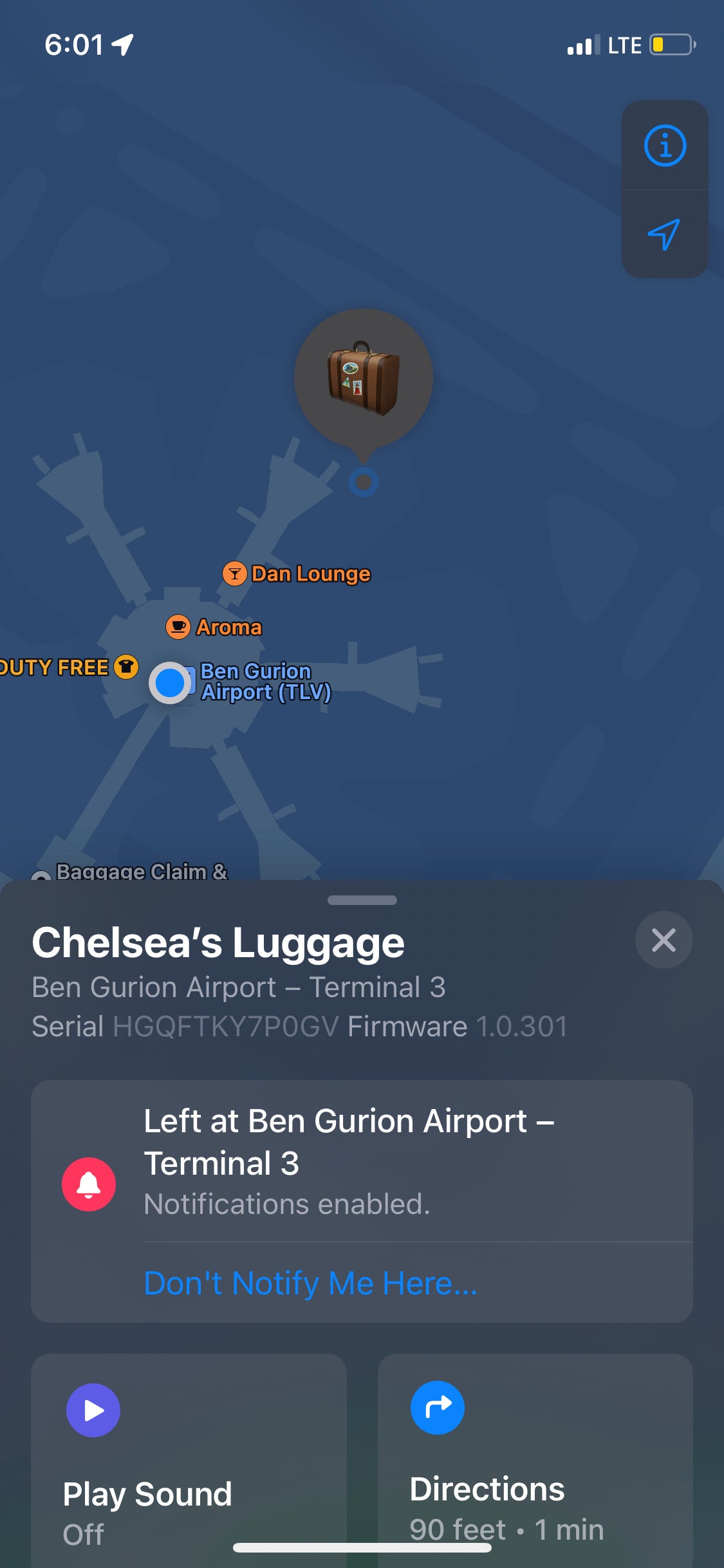
The feeling did not last long, however, as my exasperation with my AirTag’s constant updates returned during the trip. I received a notification each time I parted with my suitcase at the hotel – which meant multiple times a day.
It is possible to disable AirTag notifications, but I chose not to for the purpose of my experiment…and because I didn’t realise it was a possibility until a week into the trip.
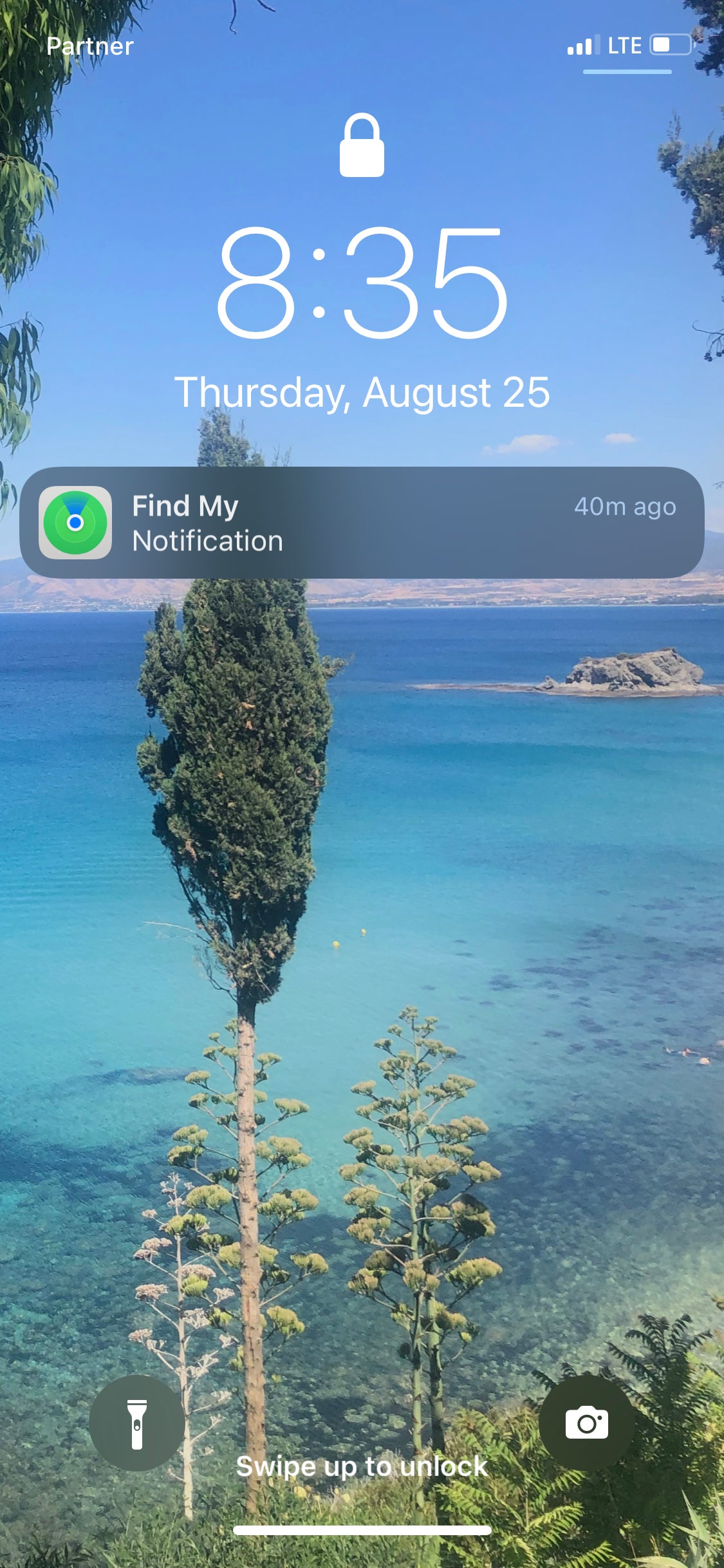
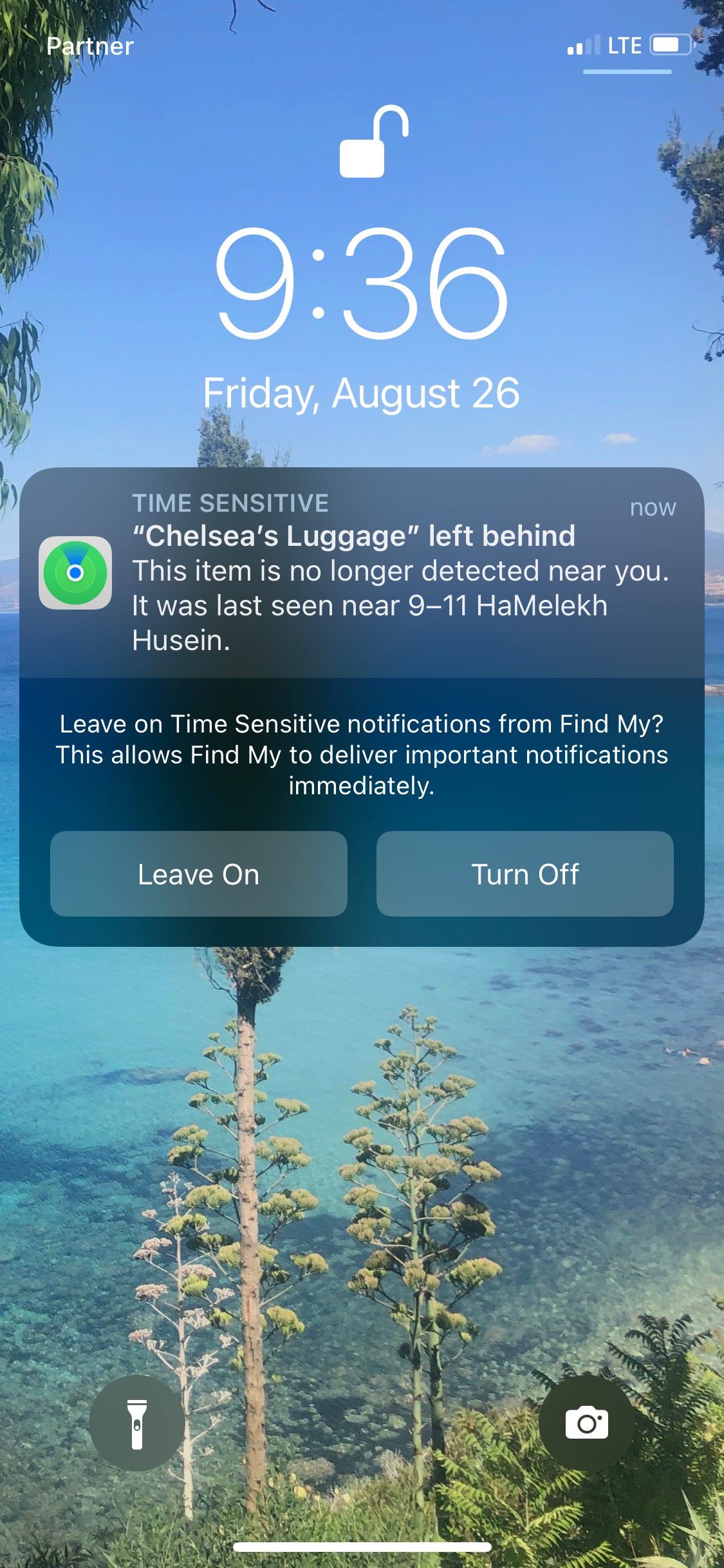
After 16 days of finding the AirTag luggage hack mostly useless, I returned to Ben Gurion airport, where I checked my bag for my return flight home after waiting on a hour-long line in the chaotically busy airport.
Unfortunately, panic kicked in shortly after I stepped foot back in New York, when my phone notified me that my luggage was, in fact, left behind.
According to Find My, while I may have made it home, my suitcase was still sitting around in Ben Gurion Airport’s Terminal 3.
Despite the clear proof on my phone that my suitcase had not boarded my flight with me, I spent a long time in denial. Surely it was a mistake? Perhaps my phone hadn’t updated after the lengthy flight?
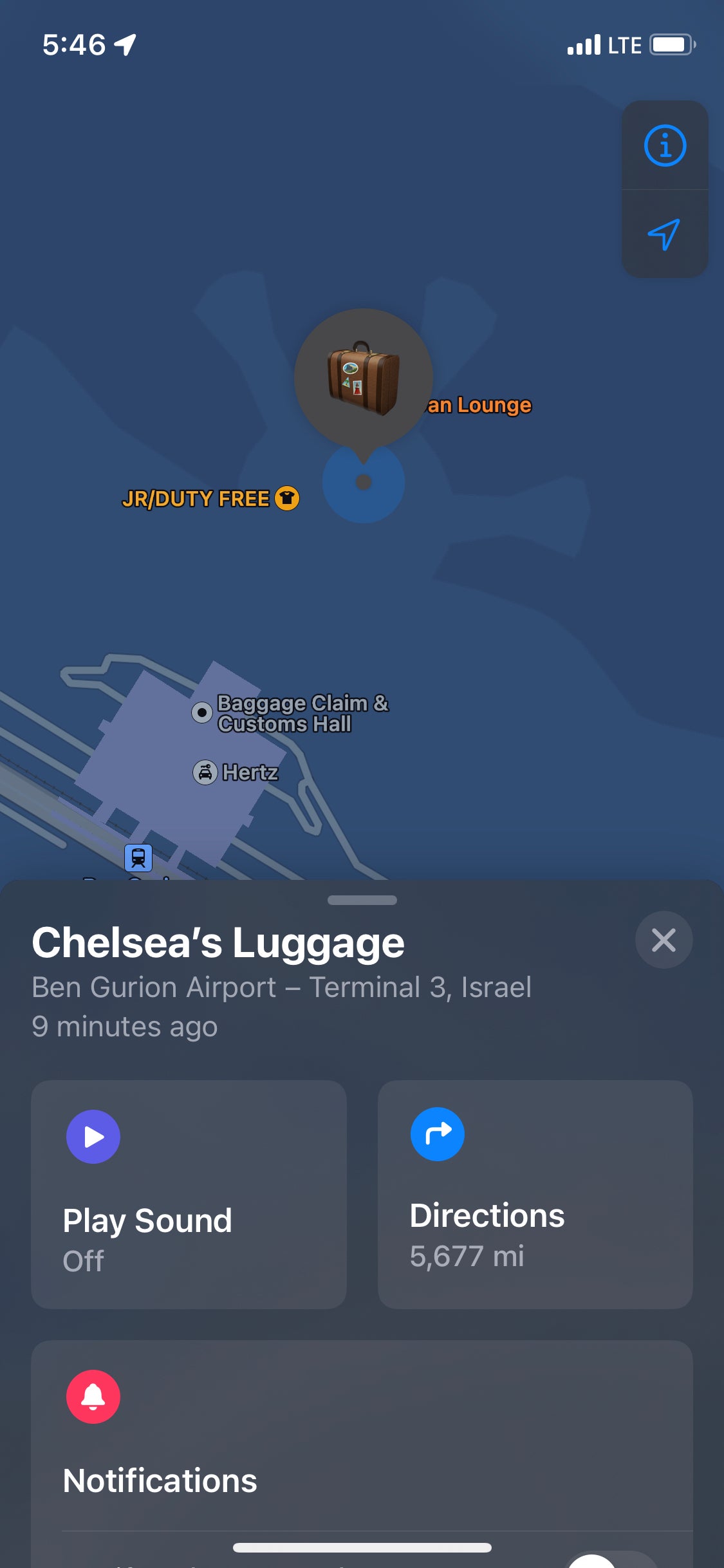
My disbelief in what the device’s Bluetooth tracking was telling me continued as I walked to baggage claim, where I held out hope that my suitcase would appear.
It wasn’t until an airline employee began gathering the still-revolving suitcases that had been left behind and pulling them off to the side that I came to terms with what Find My, and my AirTag, were telling me - my suitcase was indeed still in Israel.
If the AirTag was meant to save me time searching for my suitcase at baggage claim, it hadn’t. However, when it came time to finally broach the subject of my missing luggage with a Delta employee, it did mean I had proof to offer.
My proof wasn’t necessary, as it turned out the Delta employee I anxiously approached wasn’t surprised by my delayed bag. According to her, Ben Gurion has a reputation for leaving a few heavier bags off of each flight and putting them on the next one.
She confirmed the bag was indeed still in Israel with a simple check of my luggage tag receipt, at which point she directed me to Delta’s offices, where I was meant to schedule delivery of my missing luggage.
While waiting in line, I took the opportunity to ask the man behind me whether he was there for the same reason I was. He confirmed he was, at which point we reached for our phones simultaneously to show one another proof of our delayed bags in the form of our Find My apps.
The Delta office employees didn’t seem shocked by my late bag either. After all, the issue has become increasingly common, with The Points Guy noting that “more than 684,000 bags were mishandled in the first quarter of 2022,” as reported in data from the Air Travel Consumer Reports published by the Department of Transportation.
Recent chaotic holiday travel has only worsened the issue, after thousands of cancelled flights due to inclement weather resulted in pile-ups of lost luggage in airports around the country.
As for what constitutes “mishandled” luggage, the Bureau of Transportation Statistics defines mishandled bags as items that are “lost, delayed, damaged or pilfered”.
While airlines have likely grown accustomed to mishandled baggage reports, the Delta employees did seem mildly impressed when I showed them my phone screen, where my suitcase’s location was clearly displayed in Terminal 3 of the Israeli airport.
“That’s helpful,” one Delta agent remarked, before assuring me my bag would be delivered to me within 24 hours.
Despite the promise, my luggage wasn’t delivered the next day. However, I was able to see when it arrived in JFK, where it sat for an additional 24 hours. During the time my suitcase spent alone in the airport, it was moved around occasionally, which I learned from incessantly checking my Find My app.
I had hoped to use the AirTag to track my bag’s departure from JFK to my apartment, but, two days after my suitcase went off on its own, I awoke to a phone call at 5am informing me my luggage was outside of my building. After near-constant notifications during my trip, I had slept through the one update I had actually been waiting for.
When I look back on the trip, and the role my AirTag played, I’m not really sure whether the device was useful, or if it simply confirmed what I already knew - that my luggage was in my hotel where I left it, and that my luggage wasn’t in New York when it should have been.
After all, apart from confirming my fears that my suitcase was left behind, which I didn’t fully believe until I saw the empty baggage claim belt for myself and spoke to Delta, the AirTag couldn’t offer any additional help.
While I knew when my suitcase arrived in New York, if I wasn’t able to go in search of it myself, did it even matter that I knew where it was?
If you are someone with a tendency to misplace their keys, I could see why an AirTag could be a useful investment. But, if you were hoping the small circular devices would be the answer to the baggage issues plaguing airports, I’d say I have bad news.
Join our commenting forum
Join thought-provoking conversations, follow other Independent readers and see their replies
Comments


Bookmark popover
Removed from bookmarks